- Home
- Peter Straub
Mystery brt-2 Page 2
Mystery brt-2 Read online
Page 2
When he got back in the house he went wordlessly upstairs with Tom’s father. Tom watched him go, and when both his father and grandfather had closed his mother’s bedroom door behind them, he went into the study and pulled the Mill Walk telephone book onto his lap and turned the pages until he came to Wendell Hasek’s name. Loud voices floated down the stairs. His grandfather said “our” or “hour.”
Tom became aware of a thin sound like the cry of an animal a moment after he had ceased to hear it: then he immediately wondered if he had heard it. The cry lingered in his inner ear, probably the only place it had ever existed. No sound as soft as that had a chance of being heard in the clopping and rattling from Calle Burleigh.
Tom longed to be home, not stranded in a foreign district. The traffic on both sides of the boulevard blocked his passage across Calle Burleigh as effectively as a wall. There were no traffic lights on Mill Walk in those days, and the rows of vehicles extended as far as he could see. He would have to wait for the end of rush hour to cross the street, and by then darkness would be very near.
Then he heard the actual sound, not its sudden absence. It surrounded all the other noises of Calle Burleigh like a membrane. The cry disappeared into itself and vanished by gradations, like an animal that begins by swallowing its tail and ends by devouring itself altogether.
The cry came again, a wavering rose-pink cloud rising up from the block behind Calle Burleigh. The cloud broke into a stuttering series of dots like smoke signals and coalesced into a bright thread that went sailing over the tops of the houses.
Tom began to drift eastward on the pavement, his back to the streaming traffic. He slid his hands into the pockets of his white cotton trousers. His white button-down shirt, streaked with grey here and there by the milk cartons, adhered to his back.
The houses on Calle Burleigh gave him a broken and interrupted view of the forbidden street. Between two massive redbrick houses with wide porches Tom saw the two-story yellow and brown building and a smaller house, of rough white stone joined with thick ropes of mortar, beside it. He found himself before a brown wooden house as ornately ornamented as a cuckoo clock. He kept moving and looked through to the backs of brick houses on the next street. Facing him was a taller, two-story building of dirty cream-colored brick in which a broken first-floor window had been replaced by grease paper. In a sudden cessation of noise as the traffic stopped, he heard chickens clucking in the yard.
The pink cloud rose above the houses and thickened and narrowed, thickened and narrowed.
The traffic started up with clanks and shouts, with heavy hooves striking the ground, with cracking whips and ringing bells.
Tom moved sideways to get to the other side of a gloomy Gothic structure with a turret and a widow’s walk. A curtain shifted, and Tom had an impression of grey hair and a skull-like face peering out. The creature behind the window moved back just enough to become a grey blur.
The thin grey fingers disappeared, and the curtain dropped. Tom moved sideways, thinking in a way that was not quite verbal that he was not in his real life, but in some terrible dreamlike state from which he had to escape before it claimed him forever.
In the next instant the cry went up again, this time clearly from the little street Tom could see between the houses of Calle Burleigh.
At the end of the block he realized that he had been hearing the cries of an unhappy dog. It howled and whined at once, sending up another cloud of pink steam.
Funny, Tom thought—how much that dog managed to sound like a child.
Tom looked up at the street sign on the corner. TOWNSEND was the name of the side street. He knew nothing in this neighborhood; he had not even known of the long green open area with a bandshell, swings, a seesaw, luxuriant shade trees, and a few exhausted animals in tiny cages, which lay half a mile east on Calle Burleigh. The milk driver had been astonished that any resident of Mill Walk would not recognize Goethe Park.
Tom stepped around the corner. A dark green metal rectangle with the legend 44TH STREET stamped in relief and painted a shining, almost incandescent white faced him from the next corner. In the section of Mill Walk that Tom knew, streets had names like Beach Terrace and The Sevens, and this designation seemed eerily impersonal to him.
The creature sobbed and snarled and choked.
Tom saw a hairy half-human thing sprawled in the dust, a thick chain lashed around its neck, its ragged fingernails digging into the dirt of its pen.
With the arrival of this image came a stomach pain so strong and sharp he nearly vomited. He clutched his stomach and sat down on the lawn of the corner house. It seemed to him that what he had seen was himself. His heart fluttered in his chest like a bird chained to its perch.
A door slammed behind him, and Tom turned to see a wide old woman assessing him from the front step of the corner house.
“Get off my lawn. Right now. That’s trespassing, what you’re doing. I won’t have it.” The woman spoke with a strong German accent that made each of her syllables strike Tom like a well-aimed brick. She was a nightmare version of Lamont von Heilitz.
Tom said, “I was feeling a little sick, and—”
The old woman’s face darkened. “L-I-A-R! L-I-A-R! Get lost!”
She began grunting down the steps, and when she reached the bottom, waded toward him as if she intended to launch herself at him. “Talk back, hey? I won’t have you tramping on my grass, you S-C-U-M, get back where you belong—”
Tom had already jumped up and was walking quickly backwards to the safety of the sidewalk.
“Back to your own place!” she shouted. Her blue housedress billowed around her as she advanced on Tom. He began backing up the sidewalk toward the next side street.
Now the woman stood on the very edge of her domain, with the toes of her flat slippers just overlapping the sidewalk. She had extended her arm and index finger very determinedly toward the alley and 44th Street. Her face was an amazing red-purple. “Sick and tired of you brats walking all over my property!”
Tom turned around and ran. He thought to cut up the alley between Calle Burleigh and 44th Street, but as soon as he swerved into the alley her voice exploded behind him: “Can’t sneak into my yard that way! You want the police? Keep going!”
He looked over his shoulder and saw her surging down the sidewalk toward him. Tom swerved out of the entrance to the alley and ran toward 44th Street. The woman bawled out a phrase Tom did not understand, or which he misheard: “Cornerboy! Stupid cornerboy!”
On the corner of Townsend and 44th Street he turned around again. She was standing at the entrance to the alley, puffing hard, her hands on her hips. “S-C-U-M! That’s what you are, you cornerboys!”
“Okay, okay,” Tom said. His heart was still beating hard.
“I see you where you live!” she yelled.
He turned west into the next block, and after he had taken a few steps his view of her was cut off by the house on the corner.
The flawless enameled sky of the Caribbean had begun to show the first traces of the yellow that soon would flash over its entire surface and darken in a moment to purple, then into real night.
Tom wondered if the old woman had gone back into her house. She was probably waiting to make another run at him if he tried to sneak back around the corner.
He lifted his foot and forced his leg to thrust it forward. A forlorn wail immediately blossomed in the air before him. He froze. He glanced at the houses on either side of him—heavy curtains had been drawn over front windows in both houses, giving them a vacant, closed-up look. At this time of the year, nearly everybody in Mill Walk kept their windows open to catch the Atlantic breezes. Only Mr. von Heilitz kept his windows closed and his curtains drawn. Even the people who lived in the “native” houses, naturally cooler than the European or North American buildings, never closed their windows during the summer months.
Of course, Tom thought, they closed their windows so that they would not hear the creature.
&nbs
p; Tom stepped forward again, and up ahead of him, off behind one of the houses across the street to his right, the creature uttered a protest that set the chickens flapping and clucking: He thought he was going to melt down into a stain on the sidewalk. He would have to take his chances on the old woman’s having gone back inside her house. He turned around.
And then he was so startled he nearly jumped off the sidewalk, for no more than five or six feet behind him was a teenage boy his own height, frozen in place with one foot in advance of the other, his hands held out in a straight line from his elbows. The boy, who clearly had been trying to sneak up on Tom, looked as startled as his quarry. He stared at Tom’s face as if he had been stuck with a pin.
“Okay,” he said. “Hold it right there.”
“What?” Tom said. He stepped backwards.
The teenage boy stared at Tom with a very careful absence of expression on his broad, sallow face. The only animation in his face was in his eyes. A scattering of pimples lay on his forehead beneath a fringe of black hair. A magnificent pimple reddened the entire area between the left corner of his mouth and his chin. He was wearing jeans and a dirty white T-shirt. Hard, stringy muscles stood out in his biceps, and premature lines of worry bracketed his mouth. At thirteen, he had the face he would carry with him through all of his adult life. What struck Tom most was the jumpiness in the boy’s flat black eyes.
“Hey, calm down,” the boy said. He licked his lips as he considered Tom’s white button-down shirt and white trousers.
Tom retreated several steps. “Why were you sneaking up on me?”
“Tell me you don’t know,” the boy said. “Sure. You don’t know anything about it, do you?” He licked his lips again, and this time really scrutinized Tom’s clothes.
“I don’t have any idea of what you’re talking about,” Tom said. “All I want to do is go home.”
“Uh-huh.” The boy disbelievingly moved his chin rightwards, then back to center, executing half of a head-shake. His gaze shifted from Tom to a point behind him and to his left, and the impatient expression softened with relief. “Okay,” he said.
Tom looked back over his shoulder and saw a teenage girl marching toward him from what seemed to be the source of the creature’s sounds. Her black hair hung straight to her collarbone and swung as she walked, and she wore tight black pedal pushers and a black halter top, very dark black sunglasses, and what looked like dance slippers. She was four or five years older than the boy. To Tom, she looked completely grown up. He saw that she did not care at all about her brother, and that she cared even less about him. She came toward them across the street on a diagonal line from the steps of the two-story brown and yellow house. A fat man with a stubbly brown crewcut leaned against one of the side windows in the little bay, his arms folded over the frame of the lower windowpane and his large fleshy face pressed against the upper pane.
The girl wore unusually dark lipstick, and had pushed her full, rounded lips together to form a pouty little nonsmiling smile. “Well, ho hum,” she said. “And what are you gonna do now, Jerry Fairy?”
“Shut up,” the boy said.
“Poor Jerry Fairy.”
She was close enough now to examine Tom, and peered at him through the black sunglasses as if he were gunk on a laboratory slide. “Well, is that what Eastern Shore Road boys look like?”
“Shut up, Robyn.”
Robyn slid the sunglasses down her nose and peered at Tom through amused dark eyes. For a second Tom thought she was going to stroke his cheek. Instead she pushed her glasses back up over her eyes. “What are you gonna do with him?”
“I don’t know,” said Jerry.
“Well, here comes the cavalry,” said Robyn, smirking over her brother’s shoulder. Jerry turned sideways, and Tom saw coming around the side of a native house a fat, angry-looking boy, with a striped T-shirt and stiff new jeans rolled up at least a foot, alongside another boy several inches shorter and almost skeletally thin. The second boy’s shirt was so much too large for him that the shoulders fell halfway to his elbows and his neck swayed up out of the gaping collar. The smaller boy trotted beside the other, grinning widely. “They’ll be a big help,” Robyn said.
“More than you,” said her brother.
“I wish you’d tell me what’s going on,” Tom said.
“You shut up too,” Jerry fired at him. He blinked rapidly several times. “You want to know what’s going on? Why don’t you tell me, huh? What are you doing here?”
Tom opened his mouth and found that he had no answer to that question.
“Huh? Huh? All right, okay?” Jerry’s tongue flicked over his lips again. “You tell me, okay?”
“I was just—”
Jerry’s eyes flashed up at Tom, and the fury in his face killed the sentence.
Robyn made a gesture of distaste and stepped away.
“I’m going home,” Tom said to the side of Jerry’s outsized head. He moved backwards. Jerry’s eyes flashed at him again, and then his arm flashed out, and before Tom knew what was happening the other boy had struck him in the chest. The blow almost knocked Tom off his feet. Before he had time to react or recover, Jerry shifted his feet and punched the side of his head.
Wholly instinctively, Tom pivoted on his left foot and with all his strength sent his right hand straight at the other’s face. His fist landed squarely on Jerry’s nose, and broke it. Blood began squirting down Jerry’s face.
“Asshole!” screamed his sister.
Jerry dropped his hand from his face and began lumbering toward Tom. Blood jumped from his nose and spattered onto the T-shirt.
“Nappy! Robbie! Get him!” Jerry screamed in a high-pitched voice.
Tom stopped trotting backwards, suddenly angry enough to take on Jerry and his friends too. He lowered his hands and saw doubt move in Jerry’s worried eyes. Again he threw out his right hand without actually aiming at anything, and this time struck Jerry’s Adam’s apple. Jerry went down on his knees. Fifteen yards away and gaining fast, the fat boy in the rolled jeans had taken a knife from his pocket and was waving it as he ran. The smaller boy also had a knife, one with a long narrow blade.
A red-gold gleam from the low sun bounced off the skinny knife. Tom skipped backwards, turned around virtually in midair, and ran.
The boys behind him began yelling. When Tom drew level with the brown and yellow house, the front door opened, and the man who had been leaning against the window came out on the front stoop. His face, as flat and impersonally unhappy as Jerry’s, swiveled to track Tom’s progress. He gestured to the running boys to hurry up, catch him, drag him down. All of this was communicated in a gloomy gestural shorthand.
The world beneath this one …
Tom managed to pick up speed, and the boys behind him yelled for him to stop, they would not hurt him. They just wanted to talk to him, they were putting away their knives. Look, the knives were gone, they could talk now.
What’s the matter, was he too scared to talk?
Tom looked over his shoulder and saw with surprise that the smaller boy was standing in the middle of the street, canted on one hip and grinning. The pudgy boy in the new jeans was still charging after him. The chaos-man had left his front steps and was wobbling across the sidewalk toward his son, who was hidden behind the figure of the running boy. The fat boy still held his knife, and did not at all look as if he was interested in a friendly talk. His belly surged up and down with each step, his eyes were slits, and so much sweat came from his head that he was surrounded by an aureole of glistening drops. The skinny one pushed himself forward into a run a moment after Tom looked back, and began gaining at once on the fat boy and Tom.
The afternoon had passed into its last stage with tropical swiftness, and the air had turned a darkening purple. When Tom approached the next corner, the white of the cross street’s name gleamed out with an unnatural clarity and spelled AUER, a word that seemed to reverberate with ominous lack of meaning.
Auer.
/>
Our.
Hour.
Tom wheeled wide around the corner, and a block away saw the continuous stream of vehicles that filled Calle Burleigh. The haze of dust had vanished into the purple dark, and headlights, bicycle lamps, and shining lanterns moved along with the traffic like a swarm of attendant fireflies. An unhappy horse whinnied and stamped a foot.
One of the boys pounded around the corner, and, far sooner than Tom had expected, the other followed. Another glance over his shoulder showed him that the skeletal teenager had managed to run past the fat one and was now only some fifteen yards behind. He was lifting his arms and legs high in a natural runner’s lope, the fish knife back in his hand, and he was still gaining on Tom. He had been so sure of being able to outrun Tom that he had pretended to get winded and drop out. The arrogance of this charade terrified Tom nearly as much as the knife: it was as if the boy could never be defeated. In a moment or two he would close in on Tom, and by then it would be so dark that the people leaning out of their windows, curious about all this running, would not be able to see what would happen next.

 Poe's Children: The New Horror: An Anthology
Poe's Children: The New Horror: An Anthology Koko
Koko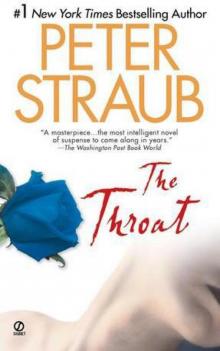 The Throat
The Throat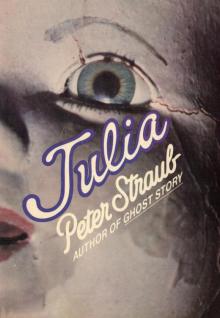 Julia
Julia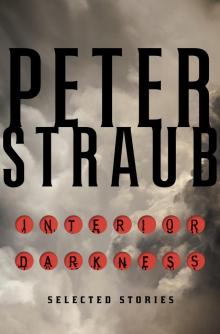 Interior Darkness: Selected Stories
Interior Darkness: Selected Stories A Dark Matter
A Dark Matter Floating Dragon
Floating Dragon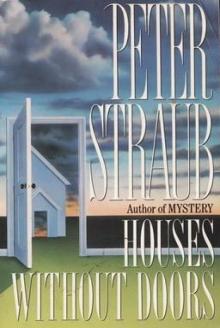 Houses Without Doors
Houses Without Doors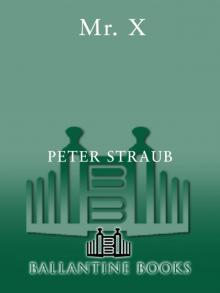 Mr. X
Mr. X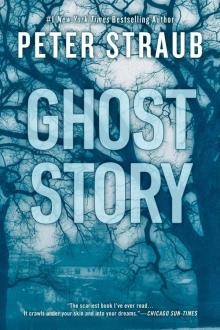 Ghost Story
Ghost Story Mystery
Mystery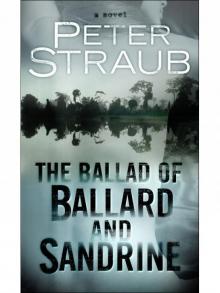 The Ballad of Ballard and Sandrine
The Ballad of Ballard and Sandrine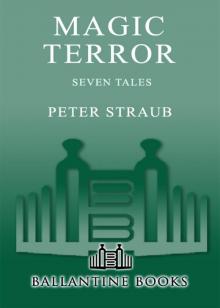 Magic Terror
Magic Terror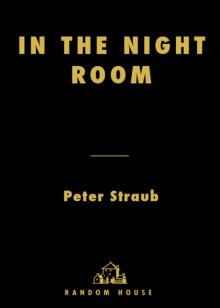 In the Night Room
In the Night Room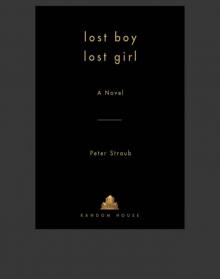 Lost Boy Lost Girl
Lost Boy Lost Girl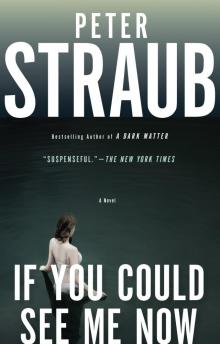 If You Could See Me Now
If You Could See Me Now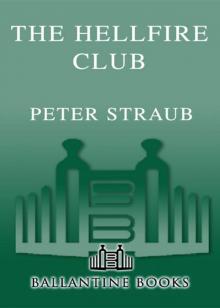 The Hellfire Club
The Hellfire Club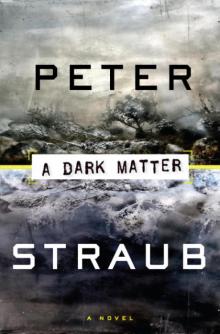 A Dark Matter: A Novel
A Dark Matter: A Novel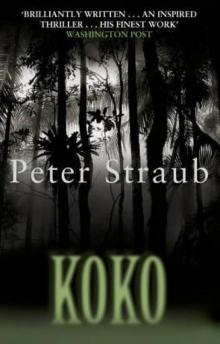 Koko brt-1
Koko brt-1 Shadowland
Shadowland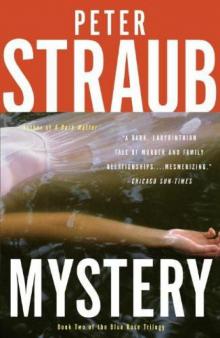 Mystery brt-2
Mystery brt-2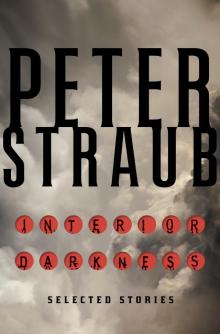 Interior Darkness
Interior Darkness Poe's Children
Poe's Children